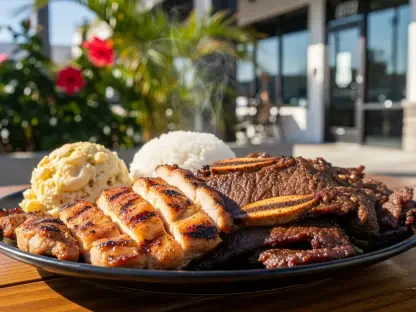Katarina Railko is renowned in the hospitality realm with a strong background in travel and tourism. Her expertise in entertainment and events makes her an influential voice in understanding the dynamics of expos and conferences. Today, she shares her insights on the unfolding situation with Lichfield District Council and Cocker Hoop Creative, focusing on the implications for the community and local businesses.
Why did Lichfield District Council decide to ban Cocker Hoop Creative from organizing the food festival?
The council’s decision stems primarily from the issues surrounding the cancellation of the Yorkshire Dales Food and Drink Festival. This abrupt cancellation raised significant concerns about the organizer’s reliability, especially since media reports suggested unpaid talent and artists. The council likely perceived this as a risk to the community and local businesses who depend on the festival’s success.
What were the main reasons behind the cancellation of the Yorkshire Dales Food and Drink Festival by Cocker Hoop Creative?
While detailed specifics remain within the internal investigation, the main concern seems to be financial mismanagement, based on reports of unpaid artists. Such economic challenges, if not actively controlled, could lead to abrupt cancellations, undermining trust in event organization.
Has the council conducted any investigations or reviews into Cocker Hoop Creative’s actions? If so, what were the findings?
Yes, Lichfield District Council undertook a review of Cocker Hoop Creative’s endeavors, which ultimately resulted in revoking the license for the festival. While the council hasn’t publicly detailed the findings, the decision indicates serious concerns about event execution, possibly stemming from financial discrepancies and logistical failures.
How does the council plan to ensure the success and smooth operation of this year’s Lichfield Summer Food Festival?
The council appears committed to maintaining the festival’s standards by offering free pitches to traders previously booked with Cocker Hoop Creative. By actively communicating with local businesses and ensuring a seamless transition in organizing, they intend to safeguard the event’s reputation and success.
How many traders have already booked and paid for pitches with Cocker Hoop Creative, and how is the council identifying them?
The council is reaching out to traders, verifying bookings through submitted evidence of payment. This method fosters transparency and trust, allowing seamless integration into the event without undue financial loss for the traders.
What process should traders follow to claim a free pitch at the Lichfield Summer Food Festival?
Traders need to contact the council via the provided events email, showcasing proof of previous payment to Cocker Hoop Creative. This straightforward approach ensures they can secure a complimentary spot, preserving their investment in the festival.
In stepping in to organize the festival, what challenges does the council anticipate it might face?
Organizing on short notice poses logistical challenges, including rallying sufficient resources and staff, managing vendors’ expectations, and ensuring high-quality entertainment. However, the council’s proactive measures aim to mitigate these hurdles, leveraging local engagement and support.
Can you elaborate on the economic and cultural significance of the Lichfield Summer Food Festival to the local community and businesses?
The festival is critical to Lichfield’s cultural tapestry, attracting thousands of visitors while boosting local commerce. Beyond mere economics, it celebrates local gastronomy and artisanship, firmly positioning Lichfield as a vibrant tourist destination.
How has Cocker Hoop Creative responded to the council’s decision, and what are their main concerns?
Cocker Hoop Creative expressed disappointment and planned to seek legal guidance, emphasizing their decade-long successful management of the event. Their concerns revolve around the sudden permit rejection without prior consultation, impacting their established reputation.
Could there be any legal implications or disputes arising from the council’s decision to take over the event?
Given Cocker Hoop Creative’s intent to pursue legal advice, disputes might arise regarding contractual obligations and potential losses. Legal discussions would likely focus on public safety, accountability, and financial impact on both parties.
How do you believe this situation will impact the reputation of Cocker Hoop Creative?
If unresolved, this controversy could tarnish their reputation, casting doubt on their reliability. However, satisfactory explanations and improvements can turn adversity into a stepping stone for future resilience and leadership in event management.
In the ten years that Cocker Hoop Creative organized the festival, what were some key achievements or highlights?
Cocker Hoop Creative has notably drawn over 175,000 attendees annually, delivering economic growth and regional recognition. Their festival facilitated networking, celebrated local cuisine, and founded Lichfield’s status as a cultural hub.
How is the council addressing concerns related to unpaid talent and artists initially contracted by Cocker Hoop Creative?
The council remains focused on mitigating reputational damage by ensuring these artists are properly communicated with, though resolution specifics may rest on Cocker Hoop Creative’s commitment to addressing outstanding debts directly.
Will there be any changes or new features introduced to this year’s food festival compared to previous ones?
While details are still unfolding, the council’s involvement promises refreshed strategies and a likely emphasis on community-driven engagement to uphold the festival’s charm and success.
What message would you like to convey to the residents and visitors of Lichfield regarding the upcoming food festival?
Embrace the festival as a celebration of community resilience and cultural vitality. While transitions can be challenging, they also inspire creativity and connections that far transcend logistical setbacks.









